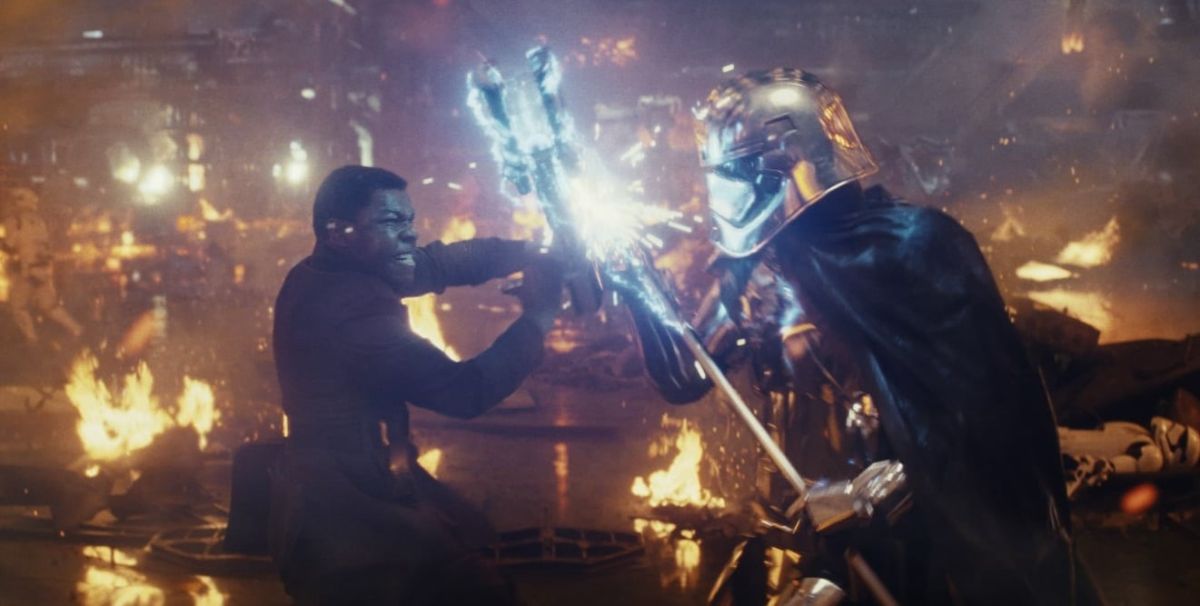Review: Star Wars – The Last Jedi

Star Wars is a strange franchise. It’s an ill-defined saga, and George Lucas has always based his vision on a foundation of change, whether it be the exciting aesthetic and emotional evolution of the original trilogy, or the attempted expansion and dull politics of the failed prequels.
J.J. Abrams’ The Force Awakens was aware but wary of this, constructing new characters and settings to an extent, but attune to a cinematic environment that rewards the nostalgic and familiar and all too often punishes blockbuster revolution.
With The Last Jedi, Disney takes its biggest risk in a number of years, handing over the reins to one man with a strange, expansive, operatic vision of what Star Wars can and should be, and it’s understandable that people are angry. This is Rian Johnson, after all, director of ‘Fly’, an episode of Breaking Bad considered one of the best or worst pieces of television in history depending on who you ask.
This year has seen franchises such as Blade Runner 2049 and War for the Planet of the Apes entrusting auteurs taking the material seriously, deconstructing and expanding their worlds and delivering stories with heart, existentialism and message. It’s astounding that, despite this, Star Wars: The Last Jedi surely ranks amongst the best.
Star Wars has never felt so solid. It has a regrettable shaky opening that unfortunately introduces its hit and miss style of humour which continues throughout. However, the action set piece culminates in a climax that emphasises the claustrophobia of cockpits, the heft and sound of the Resistance’s clunky controls and the characters and souls behind the CGI of the stylishly designed spaceships. Johnson understands the need for authentic visual effects and the clarity with which they should be shot, and at times direct his lens as if photographing a vehicle or person. Domination, submission, isolation and solidarity are all communicated perfectly with ships that start to feel like tangible personalities.
Mark Hamill’s Luke Skywalker makes his triumphant return and proves himself a true talent following his shaky performances in the original films, here his turn as an aged Jedi Master proving just as good or better than Alec Guinness’ Obi Wan Kenobi in A New Hope. Anyone disappointed with his short-lived appearance in The Force Awakens should be left extremely satisfied, with Johnson subverting and challenging our perceptions of Hamill’s character before delivering precisely what we’ve been waiting for these long 34 years since his departure in Return of the Jedi.
The respect for the craft of acting, especially with regards to our perceptions of persona are realised wonderfully in Johnson’s entry, allowing for quiet moments of dialogue and connections between characters that the frisky pace of The Force Awakens couldn’t stop for. Most specifically, Adam Driver is allowed to be Adam Driver, connecting an awkward sensitivity, a cautiously dominant and husky cadence to Kylo Ren that expands the conflict behind the seething anger of his antagonist.
This works especially well with Daisy Ridley’s Rey, who is just as inquisitive and resourceful as before, but with an unexpected conceit. She is granted communication with Kylo in scenes establishing both her righteous anger and willingness to empathise. This is one of the ‘talkiest’ entries of the Star Wars franchise, but it’s all in favour of the world and character building, and it’s admirable for a franchise so concerned with the completely separate dichotomy of the light and dark to so suddenly and effectively introduce the concept of grey.
Complaints about the second act are well-founded, and there does exist a chase scene that’s a little reminiscent of the prequels. However, the benefit of the introduction of Rose and Benicio Del Toro’s DJ greatly outweigh the slight shortcomings, as the concept of a Star Wars movie being a complete ensemble piece just works (Laura Dern is also extremely welcome), and the three plot threads culminate wonderfully in one of the most striking and cathartic moments of visual splendour you’ll see all year.
The complexity of its plot may extend the running time and roles of its characters, but it’s completely necessary. Not least by ensuring the late, great Carrie Fisher’s General Leia as a crucial feminine through line that not only delivers one of her best performances, but, with the inclusion of Dern as others, finally removes the militant, boys’ club atmosphere of a Rebellion supposedly fighting for galactic equality. This a movie that indirectly challenges the exciting yet outdated masculinity of Han Solo, Oscar Isaac’s Poe Dameron a vice for addressing the problems of a franchise that, through no fault of its own, started in the 1970s, yet his character never feels short changed despite this.
Resurrecting a specific era of film-making that I believed long dead, the fact that it works so well gives me hope for its return, in a scene that is dangerously new, yet manages to wrestle the idea of nostalgia away from its status as a dirty word. Many have read The Last Jedi as being in contempt for its mythos, but Johnson’s film is first and foremost a staggeringly affectionate send-up of fandom and fantastical science-fiction by a fan and for the fans.
4.5/5







